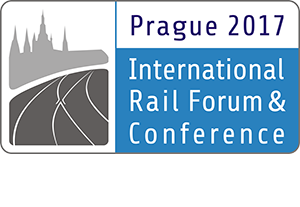International Rail Forum and Conference 2017 has jumped on the bandwagon again
As a logical coherence of previous five triumphal International Railway Conferences organised by OLTIS Group, the International Rail Forum and Conference 2017 has launched in Clarion Congress Hotel Prague on 22-24 March, 2017. The conference bore the vision “Let’s make European Railway EASY”. The conference was supported by ERA (EU Agency for Railways), Chamber of Deputies of the Parliament of the Czech Republic, Ministry of Transport of the Czech Republic, UIC (International Union of Railways), UNIFE (Association of the European Rail Industry), Shift2Rail JU, OSJD (Organization for Cooperation of Railways) and CER (Community of European Railway and Infrastructure Companies). The conference was also supported by 12 partners, particularly international organisations. The conference was traditionally organized by OLTIS Group, which is the sole recognized and successful company with events of similar type and on a European scale.
This year’s event was attended by 240 participants from 27 countries, including 46 top officials of the leading rail companies and organisations. The list of speakers contains 45 speakers including representatives of the European Commission, ministries of transport, UIC, ERA, UNIFE, CER, IBS, UIRR and other major European organisations and institutions.
During the conference on 21 March 2017, a Memorandum of Understanding on cooperation on Shift2Rail Innovations Programmes was signed between Ferrovie dello Stato Italiane and OLTIS Group in which both companies created a mutual cooperation and established the basis for common research and innovation activities particularly related to the Shift2Rail or any other collaborative program, respectively for identification of opportunities for joint bidding on calls launched under the Horizon 2020 and/or Shift2Rail program and expressed their openness and willingness to cooperate also in other activities in common interest of parties e.g. TAF/TAP TSI, etc.
The International Rail Forum, which was substantial part of the conference IRFC 2017, was held on 21 March 2017 and was released under the slogan “RAILWAY IN THE CROSSROADS OF TIMES — VISIONS AND CHALLENGES”. It was a very fruitful event where the leaders of the railway industry had opportunity to discuss the problems and find solutions towards the apprised obstacles. Moderated by Pavlína Kvapilová, speakers of the forum were the representative of the European Parliament (Martina Werner) and the top representatives of the European Commission (Maroš Šefčovič, Matthew Baldwin), international organisations UIC, CER and UNIFE (Jean-Pierre Loubinoux, Libor Lochman, Miroslav Fukan), ERA (Josef Doppelbauer), Shift2Rail JU (Carlo Borghini) and the Ministries of transport (Joe Mizzi, the Minister, Malta, Tomáš Čoček, Deputy Minister, Czech Republic).
The first day of the IRFC 2017 conference was moderated by Matthew Baldwin (European Commission) and Simon Fletcher (UIC). As a traditional part of the first day’s program, hosted by company OLTIS Group, the Minister of transport and infrastructure of the Maltese Republic (presidency of the Council of the European Union) Joe Mizzi and the Deputy Minister of transport of the Czech Republic Milan Feranec welcomed the participants with the keynote speech. Then the challenges on the theme of railway competitiveness were risen by main players of the rail industry.
The session “Railway Innovation & Research – Driver for Interoperable Future Railway” moderated by Riccardo Santoro (Ferrovie dello Stato Italiane) was very important for the future direction of the railways to innovation. SHIFT²RAIL initiative overlapped the ongoing projects, summarised the results of the completed projects and introduced the upcoming rail projects’ narratives.
UIC Director General Jean-Pierre Loubinoux in his presentation described the perspectives for railways to be in this 21st century a major actor of mobility. “Railways in facilitating the crossing of borders between nations, strongly contributes to creating interoperability between countries and their populations, including over long and very long distances”. He added: “In this century, stakeholders all over the world are recognizing that mobility by rail is in fact the backbone of an effective, integrated, multimodal transport system, thanks to its advantages in terms of capacity, safety, reliability and environmental-friendliness.”
In the session “Developing an Attractive and Competitive Railway Sector” Josef Doppelbauer, ERA Executive Director focused his presentation on what can the European Union Agency for Railways do in order to make rail attractive and competitive, focused on technical market integration with the objective to have better service of rail at lower cost. “In the battle of transport modes rail suffers from high cost of production which are determined both by the high cost of equipment and the low utilization of asset, and also from not the good quality. Both are a consequence of defragmentation of the European market. Rail has also structural innovation problems and integrates very badly with other modes of transport in particular road.”
Digitization in railway transport was a very important and interesting session of the first day of the conference. Matthew Baldwin, Deputy Director General of the European Commission DG MOVE said: “In this globalized digital era in which we live passengers expect they would access information conveniently and immediately. This easy access to information and this need for constant connectivity has also already begun revolutionalize the way we travel.”
The conference programme of the second day was divided into four sessions, moderated by Simon Fletcher and Michael Robson and dedicated to the following topics: News and best practices in freight and logistics, Implementations of railway interoperability (TAF/TAP TSI) and Railway innovations, projects and IT systems.
The conference was accompanied by an exhibition with 18 exhibitors from rail carriers, rail industry, IT companies, international organisations and media.
Integral parts of the conference were special events such as Gala Evening on the first day and Czech Evening at the end of the second day. The third day of the conference on 24 March was devoted to the professional visit to the National Technical Museum in Prague, where all participants had opportunity to explore the exhibition of the history of transport in the “transportation hall”.
More information can be found at www.IRFC.eu.
